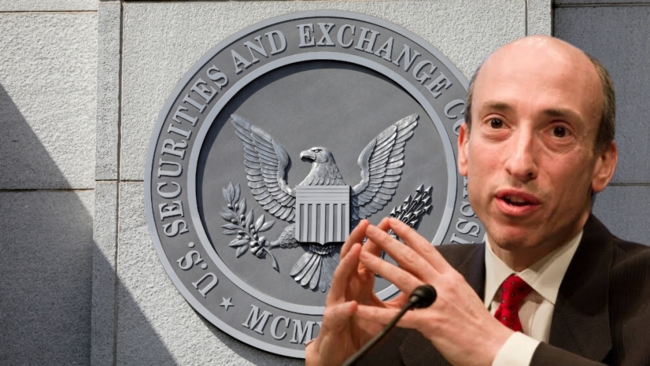Highlights:
- Gensler and SEC commissioners faced their first congressional hearing on crypto oversight since 2019.
- Congressman Emmer labeled Gensler “destructive” and criticized his crypto enforcement approach at the SEC.
- SEC Commissioner Peirce argued the agency has failed to provide clear crypto guidelines despite having the tools.
On September 24, Gary Gensler, chair of the U.S. Securities and Exchange Commission, and four other SEC commissioners—Hester Peirce, Mark Uyeda, Caroline Crenshaw, and Jamie Lizárraga—appeared before the U.S. House Financial Services Committee. This marked their first discussion on crypto oversight since 2019.
Lawmakers criticized Gensler and the agency for its aggressive enforcement strategy toward digital assets. Industry advocates and some politicians have argued that Gensler and the SEC have imposed policy uncertainty on the emerging industry for years.
JUST IN: 🇺🇸 US Congressman Tom Emmer tells SEC Chair Gary Gensler "we could not have had a more historically destructive or lawless chairman of the SEC." pic.twitter.com/D7nc4Jy2q2
— Watcher.Guru (@WatcherGuru) September 24, 2024
Gensler Grilled as Most ‘Destructive’ SEC Chair
United States Congressman Tom Emmer criticized Gensler during a congressional hearing, labeling him the most “destructive” and “lawless” chair in the regulator’s 90-year history.
He said:
“You’ve made up the term crypto asset security. This term is nowhere to be found in statute, you made it up [and] you never provided any interpretive guidance on how crypto asset security might be defined within the walls of your SEC.”
Emmer stated that the term had been the foundation of Gensler’s “enforcement crusade” against the crypto industry for the past three years. He also questioned Gensler about his agency’s handling of the Debt Box case, where the SEC sued a crypto startup for an alleged $50 million fraud scheme.
The case against Debt Box was dismissed on May 28, and the agency was ordered to pay $1.8 million in fees. Emmer claimed that SEC attorneys created a series of lies in the Debt Box case to support Gensler’s “anti-crypto rhetoric” and regulation-by-enforcement agenda. In response to Emmer’s questioning, Gensler acknowledged, “The matters in that case were not well handled.”
SEC Commissioner Peirce Critiques SEC’s Lack of Clarity on Crypto Regulation
Gensler also faced criticism from SEC Commissioner Hester Peirce. She said the SEC should have retracted the term “crypto asset security” in court a long time ago. Peirce stated that the agency has not provided regulatory clarity for crypto despite having the tools to eliminate confusion. She argued that using ambiguous language, like suggesting that crypto tokens are inherently securities, has hindered the agency’s ability to oversee markets.
Peirce said:
“[By] tucking into a footnote, we admit that now actually the token itself is not a security. That’s something that we should have admitted long ago. “We’ve failed in our duty as regulators by not being precise.”
When asked if crypto tokens need a legal definition to determine their status under securities laws, Peirce replied, “It’s always helpful to have Congress weigh in, but there certainly are some guidelines we could provide in this area that we have chosen not to provide.”
Representative French Hill supported Peirce’s views, stating that the SEC has been “frontrunning Congress on crypto regulation” and trying to take control of crypto oversight through broad enforcement actions. Hill and Peirce emphasized that statutory assistance from Congress could create a comprehensive regulatory framework, especially since the “rogue SEC” has avoided rulemaking.
Gensler Defends SEC’s Crypto Accounting Rule Despite Political Pushback
Despite requests from 42 U.S. politicians to revoke the SEC’s Staff Accounting Bulletin No. 121, Gensler confirmed it will remain in place. He called it “a good accounting bulletin.” The SAB 121 rule requires entities holding crypto to record those assets as liabilities. A repeal bill had bipartisan support but was vetoed by President Biden in June. Gensler argued the rule helps public companies understand risks related to holding crypto, citing examples like FTX and Terraform Labs’ bankruptcies.
🚨42 Members of Congress (led by @SenLummis and @PatrickMcHenry) have called on @GaryGensler to rescind SAB 121
This comes as Gensler and the full Commission prepare to testify tomorrow morning before @FinancialCmte
As a reminder, SAB 121 creates untenable conditions for… pic.twitter.com/WQQagk1nGm
— Taylor Barr (@taylorjbarr) September 23, 2024
Nickel disagreed, arguing that SAB 121 makes the digital asset ecosystem “less safe.” He claimed it prevents U.S. banks from holding crypto exchange-traded products, creating “concentration risk” by giving more control to non-bank entities. Nickel criticized the SEC for exempting Bank of New York Mellon from the rule, saying it creates “different rules for different folks.” Gensler, however, disagreed, stating, “It’s actually the same rules for different folks.”





